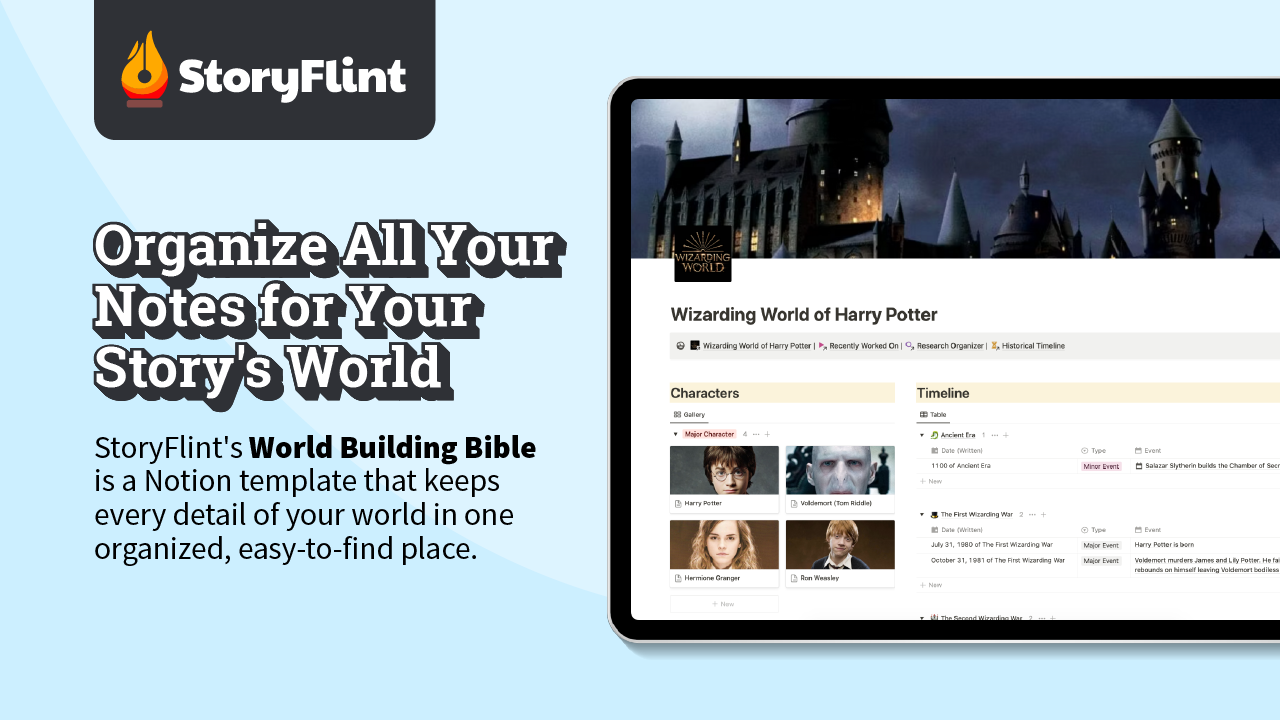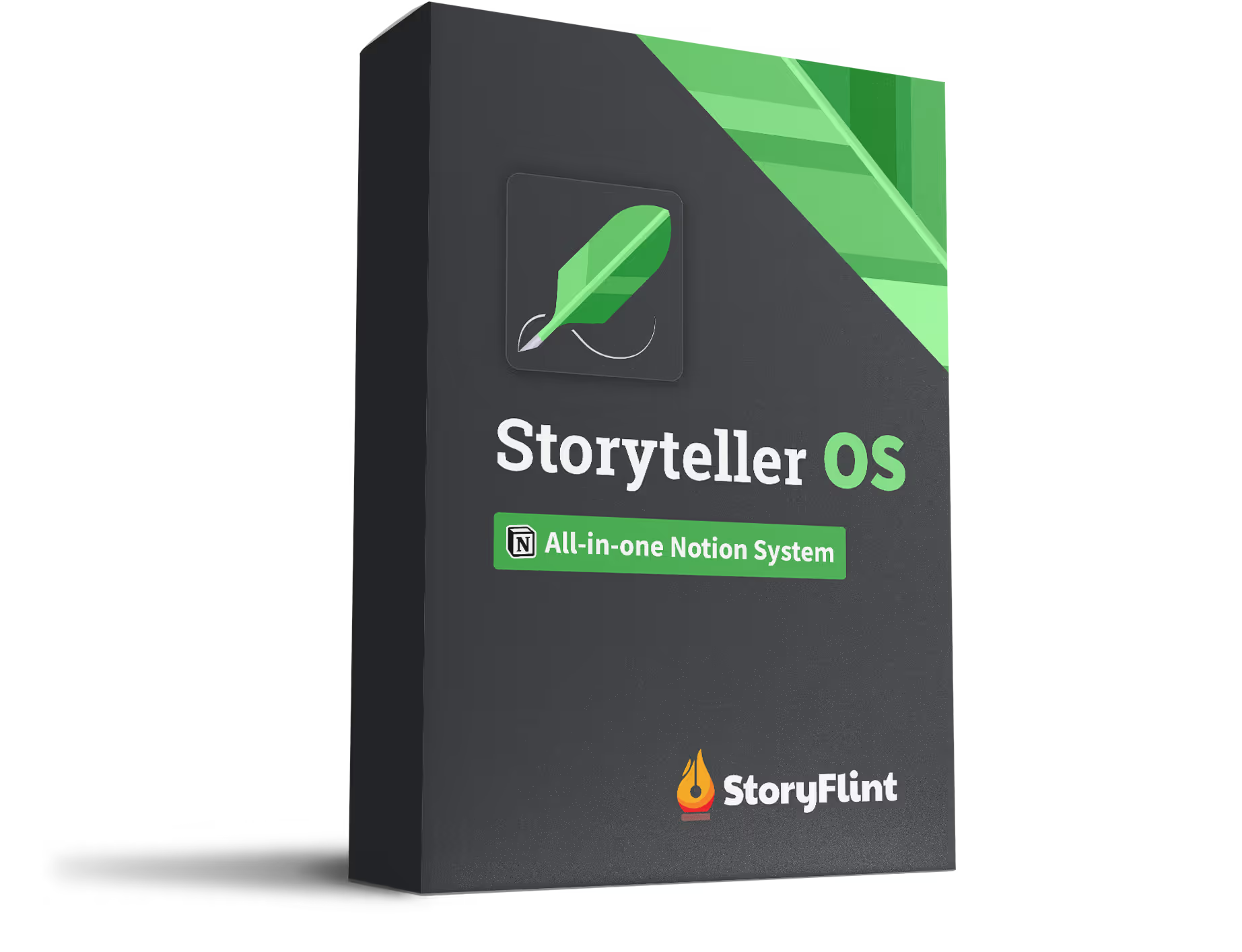Creating a lore bible is an essential part of world building. This guide will teach you how to create your own world building bible, so that your world can be rich and detailed. Let's get started!
What is World Building Bible?
A world building bible is a document that contains all the important information about your world. It can include things like the history and geography of your world, the flora and fauna of the world's countries, as well as the religions and cultures, and significant events in the world's history.
Why is it important to have one?
A world building bible is important because it helps you keep track of all the details about your world. You can do this while ensuring that your world is authentic and detailed, with no gaps or inconsistencies.
How do you build a World Building Bible?
Your world building bible should answer the who, what, when, and where of your world.
Here are the main aspects of what should go into your world building bible:
Characters
This is the "Who" of your world.
- Major Characters - The main characters of your story, such as the heroes and villains.
- Minor Characters - The secondary characters of your story.
- Historical Characters - The characters from your world's history that helped shape the world but are not part of the current story.
- Deities - The gods and goddesses of your world.
Groups
Groups are bundles of related characters.
- Gangs - A group of people with a shared mission. These can be criminal gangs or revolutionary groups.
- Societies - A group of people built around a form of government or trade. These can be people who live in a country together.
- Cultures - A group of people with shared histories, traditions, languages etc. These can be a collection of societies.
- Institutions - A group of people built around an institution such as a school or governing body. These can be students, teachers, police, or committee boards.
- Cults - A group of people built around a fanatical religious ideal.
- Races - A group of people with shared physical characteristics. These can be races of skin color or fantastical races like elves, goblins, or dwarves.
Locations and Geography
This is where the physical land comes into play, including the unique flora and fauna of the world's countries. This is the “Where” of your world.
- Continents - The major landmasses of your world.
- Countries - The political divisions of your world. These can be nations, kingdoms, or empires.
- Regions - The geographical divisions of your world. These can span over multiple countries or there can be many regions in one country.
- States/Provinces - The further divisions of a country.
- Cities - The large congregation of people living and working. These are usually near sources of water like a river or bay but they can also be built from a high-traveled road.
- Towns - The smaller versions of cities where the population is not as large and thus not as much infrastructure is needed to sustain it.
- Landmarks - The non-city locations in your world that draw people in. These can be schools, holy sites, forts, ruins, etc.
- Roads - The man-made connections of cities, towns, and landmarks that are built over land. These can include highways, bridges, trails, etc.
- Islands - Small landmasses surrounded by water. These can be solitary islands or chains of islands.
- Mountains - These can be mountain ranges or solitary peaks that have significance.
- Rivers/Lakes - The freshwater sources of your world. These are very important things to make distinct in your world because these are some of the most likely places where settlements and cities will form.
- Seas/Oceans - The saltwater expanses of your world that divide continents.
- Wildernesses - The areas of land in your world that are uninhabited by any civilization, sometimes for good reason. These can be woods, forests, deserts, or wastelands.
History
This is the “When” of your world, encompassing the world's history and major historical events.
- Major Historical Events - These are solitary events in history that impact your world. These can be the death of a leader, the discovery of new worlds, or the invention of a world-changing tool.
- Wars - These are the large-scale political conflicts that have shaped your world. These can span over a number of years and encapsulate many historical events.
- Natural Disasters - Things like floods, volcanic eruptions, earthquakes, plagues, etc.
- Reigns/Dynasties - These are periods of years where a ruler or ruling family has a significant impact on your world.
- Months - If your tale takes place in a completely new universe disconnected from our own, it’s unlikely to follow the Gregorian calendar. It may have more or fewer months in its year than ours, and the names of the months might differ.
- Eras - Another point to keep in mind is the Eras, or sometimes called Ages, in fantasy settings. Eras can be the large groups of years that break up history into distinct parts.
World Elements
This is the "What" of your world.
- Flora – Species of plants and trees.
- Fauna – Species of animals.
- Religion/Ritual – Religions, sects, systems of belief, or yearly rituals.
- Mythology – Different than religion, these are legends, folk tales, and stories.
- Item/Artifact – Objects of special significance or products to buy.
- Language – The spoken and written words of different cultures.
- Systems – The ongoing work than happens in order to keep society going (i.e. mail delivery, communication, paths of power, commerce, magic systems).
- Entertainment – Sports, games, media, hobbies.
- Clothing – Fashion or garments used for a specific purpose (i.e. special capes, cloaks, etc).
- Technology – The tools your world uses to get things done and live.
- Food/Drink – The regular nourishment found in your world either scavenging or hearty meals and alcohol.
- Disease/Medicine – Common ailments or historical plagues and the medicine or remedies used to cure/heal.
- Law/Politics – Systems of government, revolutions, inherent laws.
- Professions – Various jobs needed to keep society afloat.
- Astronomy – The stars, moon, sun, or nearby planets of your world that are out of reach.
- Weather - The climate and weather conditions that occur in certain parts of your world.
Research
In order to build a believable fictional world, you're going to need to do some about our real one. This can be anything from history documentaries, current events, or articles and Youtube videos about different cultures.
It's important to store this information and keep it organized along with the rest of your world building in your world building bible. That way you can refer back to your research if you want to expand anything in your fictional world.
Ready to Bring Order to Your World?

Worldbuilding is exciting—until you can’t remember which kingdom worships the moon and which one banned magic three centuries ago. That’s where StoryFlint's World Building Bible comes in.
It’s a pre-built Notion system designed to help you keep every detail of your story world in one place. Track your locations, cultures, religions, creatures, languages, and histories with simple, connected databases. No more flipping through old notebooks or scattered files trying to piece everything together.
This World Building Bible template gives you a visual, organized system that grows with your story—whether you’re creating an epic fantasy series or a single standalone world. You’ll see the big picture without losing sight of the small details that make it feel real.
👉 Get the World Building Bible and start building a world you can actually keep track of.
Conclusion
A world building bible is an essential tool for any author looking to create a believable and compelling world for their story. By taking the time to fill out all the different sections of your world building bible, you'll have a much better understanding of your world and be able to write about it with confidence.
By following these tips, you can create a rich and immersive world that will engage and captivate your readers. Remember to include all the details, from natural disasters to historical events, to create a believable and realistic world. Your worldbuilding bible is an essential tool for creating a good story, so make sure to use it effectively.




